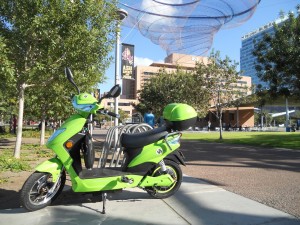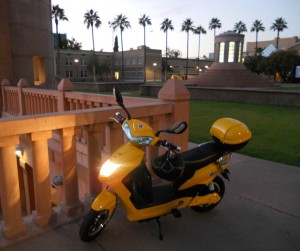Why Ride An Ebike? Why Not Ride An Ebike!
by Telpriore “Greg” Tucker
Electric bicycles (ebikes) are the new convenient form of transportation for a person that either needs to conserve their limited time to get somewhere and for someone that wants to travel a shorter distance to their destination via detours fitting for a bicycle not accessible to cars or trucks. The present models are suitable for younger ages of at least 13+, senior citizens, also working professional adults, and more practically for college students seeking a less expensive mode of transportation such as no daily gas, no monthly insurance, no yearly tags, and not even a driver’s license is required hence a more so manageable budget while in school until degree completion.
For example, on average ridership to charge a 48V battery pack on an ebike cost around $12.36 per year! (source: The Southwest Battery Bike Co). The global market for ebikes has been projected at 4M (see figure below) units in sales by 2020; excluding China where over 90% of the present ebike riders are located with sales projected at a toppling 34M units there alone (source: Navigant Research). Ebike sales are burgeoning in Europe as the second largest consumer then within the United States with a uniquely concentrated ebike ridership among states of the West Coast.
| Annual E-Bicycle Sales by Region and Forecast Scenario, World Markets: 2013-2020 |
 |
The Electric Battery Bike Organization (TeBBo) is a new club at Arizona State University of the greater Phoenix metro valley. TeBBo is based on the green technology of ebikes, which is dedicated to providing awareness of low-cost, energy efficient, and sustainable mobility to those in the community that require it and to those that desire it.
An ebike (see photos below) is basically a bicycle that can be fully powered from a battery pack located inside the body or on the frame to provide movement by an electrical hub motor mounted on the wheel. Presently, there are many types of ebikes; some that appear as traditional bikes or some with scooter-styled bodies yet is still considered an electric bike. All ebike riders to have the ability to pull the throttle for battery powered travel in the street or manually pedaled as a traditional bike as necessary when riding on sidewalks and park pathways.
  |
| Ebike (electric bicycle) photos courtesey of The Southwest Battery Bike Co. - the batterybike.com and follow on Twitter @thebatterybike |
The common power source for a scooter-styled ebike (SSEB) is the 48V lead acid battery pack that can have a total lifespan of around 6,200 miles or equivalent to about 300 cycles and breaks down to 30+ miles per charge depending on travel conditions of course after a 6-8 hours charging duration. This type of battery pack is formally known as a VRLA (valve-regulated lead acid) battery system priced at $130/kWh. Lately, the Li-ion battery has been introduced as a quickly rising, alternative power source priced at a staggering $560/kWh (source: Asian Development Bank). Though, these batteries are appreciable more expensive they have the higher specific energy of 110 Wh/kg as opposed to only 34 Wh/kg for lead acid hence the lighter travelling weight advantage. The preferred 36V Li-ion battery technology chemical makeups are LiMnO2 and LiFePO4 are rated at 800 and 2000 cycles, respectively, for their significantly enhanced lifespan and improved flammability safety as well new proprietary nano-infused compositions to further increase energy efficiency by reducing waste heat output (sources: Battery Supplies & AllCell Technologies). Nonetheless at the end of the day the end user, the consumer, plans to purchase the most affordable ebike. Therefore lead acid battery pack systems are still dominating the ebike industry.
Regardless of body style or frame they all ebikes must have these specific parameters: a low speed electric bicycle must be equipped with fully operable pedals and an electric motor of less than 750W (1 h.p.) whose max speed is less than 20 mph. This “ebike” legal designation was passed by the U.S. House of Representatives as an amendment under the Consumer Product Safety Act in early 2001 to control the influx of domestic and foreign electric powered vehicles to the roadways and sidewalks of America (source: Gov’t Printing Office). A state issued photo identification is required for ridership and a helmet is suggested in Arizona. Furthermore, ebikes fall under the wider category of motorized bicycles (MBs), which can be either electric or gas powered bicycles that must travel under 20 mph (source: Arizona Dept of Transportation).
Nowadays, we as a modern society have entered into the new Age of Sustainability coinciding with the present Information Age, which was birthed from Industrial Revolution of the past centuries. The electric bike would be considered a disruptive impact technology much like the needed upgrade from the older telephone land lines to the newer mobile phones and the transition will be just as rapid or exponentially faster as from VCR units to DVD players (source: Institute for Manufacturing). This quick transition will be very similar from solely fossil fueled transportation to a greener mobility in our neighborhoods; ebikes will be that unique, small segue contributing towards for transportation translating into energy sustainability along with electric cars. Ebikes won’t replace all fossil fuel vehicles but will more as an intermediate travel tool between a standard motored vehicle and traditional bicycle, which is convenient for local rides to nearby work, class, home then leisurely rides to the shops, restaurants, movies, and etc. Ebike riders unite!
 Telpriore “Greg” Tucker is presently a doctoral student in the Department of Chemistry & Biochemistry at Arizona State University and is in his final year towards his PhD in Chemistry. He pursues an emphasis in electrochemistry for renewable energy applications; the research towards his dissertation is the internal chemical components of low-temperature battery systems for stationary devices for power grid utilization. A project primarily funded by Sandia National Labs. In addition, Telpriore is a recent entrepreneur engaging the new upcoming era of sustainability by providing electric bikes (ebikes) for green mobility to his local community and the valley-wide metro through the business, The Southwest Battery Bike Co. Outside of his graduate career, he is an active member of the Eastlake Park Neighborhood Association (EPNA) and the Eastlake-Garfield Steering Committee (EGSC) for the Reinvent Program of the City of Phoenix.
Telpriore “Greg” Tucker is presently a doctoral student in the Department of Chemistry & Biochemistry at Arizona State University and is in his final year towards his PhD in Chemistry. He pursues an emphasis in electrochemistry for renewable energy applications; the research towards his dissertation is the internal chemical components of low-temperature battery systems for stationary devices for power grid utilization. A project primarily funded by Sandia National Labs. In addition, Telpriore is a recent entrepreneur engaging the new upcoming era of sustainability by providing electric bikes (ebikes) for green mobility to his local community and the valley-wide metro through the business, The Southwest Battery Bike Co. Outside of his graduate career, he is an active member of the Eastlake Park Neighborhood Association (EPNA) and the Eastlake-Garfield Steering Committee (EGSC) for the Reinvent Program of the City of Phoenix.
[PhD Candidate, Chair of ECS@ASU (The Electrochemical Soc.) at ASU Battery specialist of TeBBo (The Electric Battery Bike Org) For more info please email: tgtucker@asu.edu
About the Newsletter
Editors-in-Chief

Jin-Woo Ahn
Co-Editor-in-Chief

Sheldon Williamson
Co-Editor-in-Chief
TEC Call for Articles 2023 - Advances in Charging Systems
The TEC eNewsletter is now being indexed by Google Scholar and peer-reviewed articles are being submitted to IEEE Xplore.
To submit an article click here.


